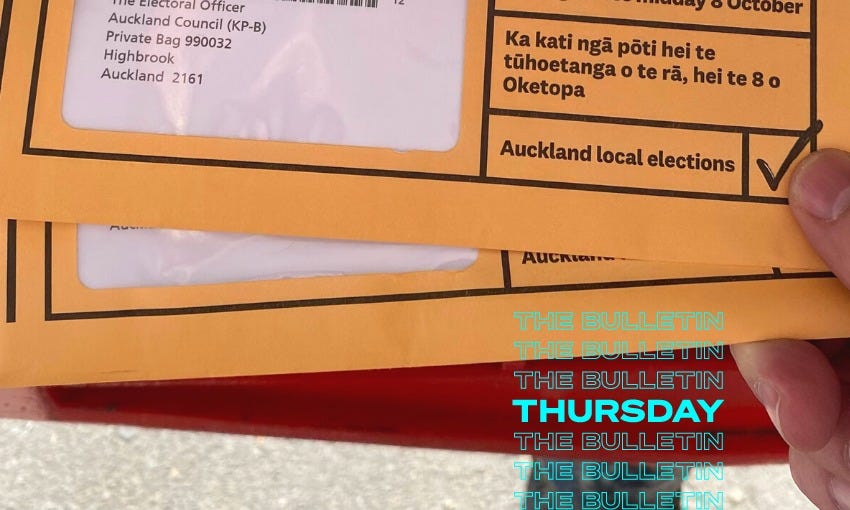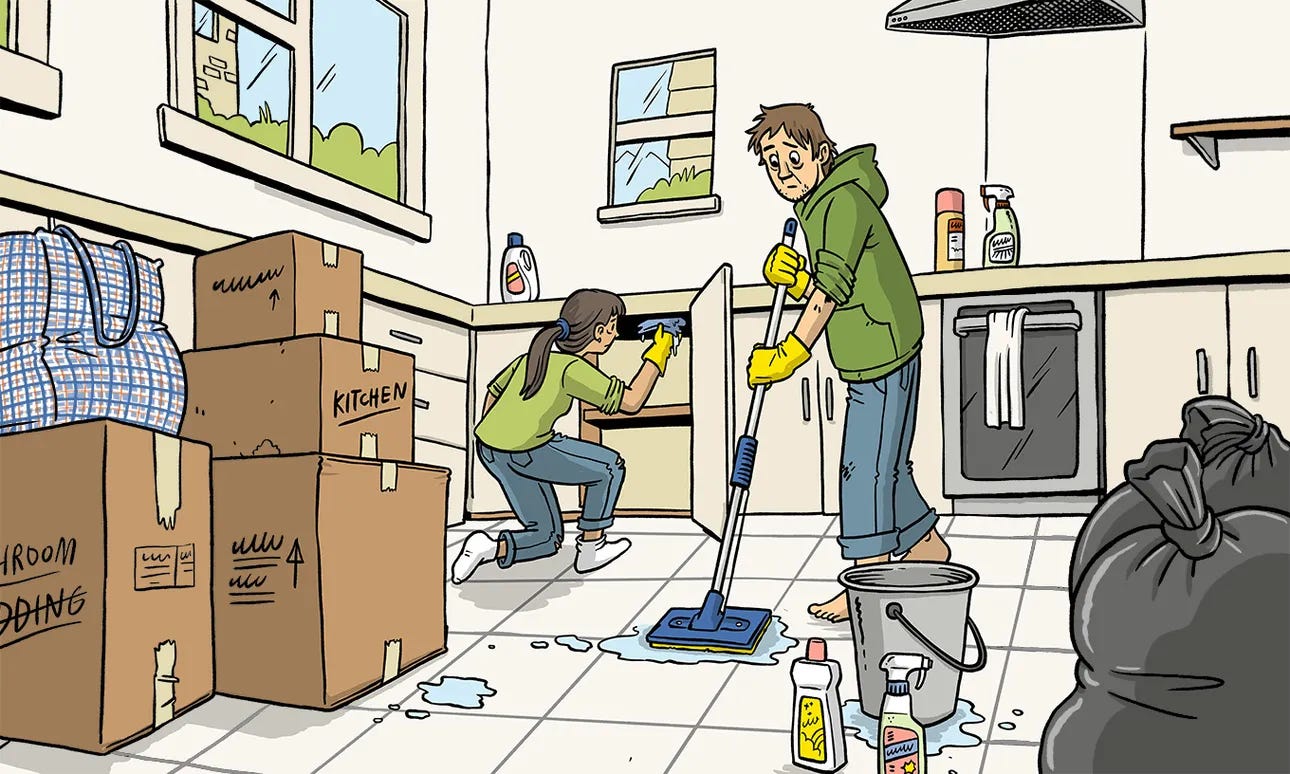In defence of postal voting
Postal voting for local elections might be arcane and ridiculous but mooted alternatives are no silver bullet.
Mōrena and welcome to The Bulletin for Thursday, September 29, by Anna Rawhiti-Connell. Presented in partnership with Z Energy.
In today’s edition: the connection between ram raids and family harm; census date announced feat. more paper; the economist with a contrarian view on inflation; but first, postal voting might not be perfect but there’s no silver bullet.
A man posts local election voting papers into endangered box (Photo: Troy Rawhiti-Connell)
Early voter turnout figures improve overnight
Yesterday, I decided to look into whether postal voting for local elections was still the go for today’s Bulletin. I went in open-minded. Has this defence been prompted by the discovery that my great uncle (secretary of the Department of Internal Affairs from 1968-1978) was partially responsible for enabling postal voting? No. Will I die on this hill? Probably not. Figures published yesterday by Toby Manhire had a lot of people concerned about low voter turnout. Manhire updated those figures later in the day and things have shifted from dismal to better than 2019 in Christchurch. Obvious caveat –it’s early days –but voter turnout for local elections has always been a bit rubbish when compared with turnout for general elections. The turnout gap between the general election in 1946 and local elections in 1947 was 56.5%.
Mode of voting conversations mask gnarlier issues
This doesn’t mean we should just accept that fact and keep putting paper into more paper and then into a dwindling number of boxes forever. But discussions about the mode of voting mask gnarlier issues like motivation, voting systems and how local government elections are run. Postal voting was used in the 60s and 70s and then adopted across the board for local elections in 1989. It was mooted as a way to address, wait for it, concerns about low voter turnout. In a 2019 very readable report on online voting, AUT political scientist Julienne Molineaux argues average voter turnout figures mask variances in elections. Things like an exciting race, or indeed a dull one.
Call for the return of polling days
We used to have polling days like we do with general elections and the Porirua and Hutt City mayors have called for a return to a set day to cast your local election votes. I will always be a fan of anything that gets us closer to Australia's democracy sausage incentives but it would cost more to run elections that way. Covid measures and two referendums notwithstanding, the 2020 general election cost $160m to run. It would also very likely require the running of local government elections to be centralised, something the Justice Select Committee has recommended the government consider. As Toby Manhire writes, repeated inquiries have resolved that turnout, participation and representation in local elections would be enhanced if the Electoral Commission was running them but that’s off the table for now.
Why can't we vote online?
Justin Hu has done a great job on Newsroom of wading through all the possible solutions offered up to counter low voter turnout and voter apathy. Based on what he’s found, there doesn’t seem to be a silver bullet to lifting voter turnout. That includes online voting, which is laden with security risks, cost and potential inequality. We actually have a handy summary of Molineaux’s 2019 report on online voting on The Spinoff. Hu also spoke to Molineaux who said the focus on online voting in 2016 and 2019 diverted resources from strategies to better engage with harder-to-reach communities. We have deployed a strategy of sorts to reach typically younger, perhaps less engaged voters on TikTok. His name is Josė Barbosa and he explains the foreign concept of paper and the practice of putting it in a box for us in this minute long video.
Experience Prof Brian Cox live on stage for Horizons: The most astonishing science show on the planet
Expect jaw-dropping new graphics depicting what was, what is and what may be in the future, from before time began to mankind’s life on far-flung planets. The most profound questions will be explored during Horizons, using the latest advances in our understanding of quantum theory, black holes, astronomy, and cosmology.Visiting Dunedin, Christchurch, Wellington and Auckland this December, this mind-expanding show is one that you won’t want to miss.
Find more information and book now at Lateral Events (sponsored).
Connection between those involved in ram raids and family harm undeniable
A new study from the Police national youth team has found that 95% of 63 young people involved in ram raids were linked to a family harm event before first coming to police attention as a suspect or offender. Family Harm is defined as any violent act inflicted by one family member on another. The sample of 63 young people was drawn from those involved in ram-raids in Christchurch, the Bay of Plenty, Auckland, and Waikato in the year to May 2022. Minister for the prevention of family and sexual violence, Marama Davidson, said it doesn't surprise her that the trauma and violence have such an impact, leading to many children committing future crimes. National's justice spokesperson Paul Goldsmith maintains there needs to be harsher consequences for youths involved in serious crimes like ram-raids.
Boots on the ground, 41% more paper
A real counting theme today as Stats NZ announced the date of next year’s census yesterday. It will be held on Tuesday March 7, 2023. As another counter to the idea that the internet is a magic bullet, there will be a return to a boots on the ground approach and paper forms. The amount of paper forms to be delivered will increase from the 3% delivered in 2018 to 44% of the surveyed population in 2023. An independent review of the 2018 census found the census to be overly complex and ineffective, with unacceptably low response rates – particularly for Māori and Pasifika. Then-chief executive of Stats NZ Liz MacPherson resigned following the review. Next year’s census will also be the first to ask about sex at birth, gender identity and sexual identity.
The Spinoff is powered by the generous support of our members.
If you value our work and want to support what we do, please consider joining up. There is no minimum to donate and every contribution is dedicated to funding our journalism and keeping it free for all. You’ll also gain a bunch of exclusive perks, such as access to events, a world version of The Bulletin written by Peter Bale, reduced advertising and more. Join today!
The economist who coined the term “guess-o-nomics”
I have a bit of a contrarian streak so I love an opposing view. This is a great read from Stuff’s Dileepa Fonseka on a counter-argument to the prevailing view about the current state of economies around the world. Fonseka spoke to David Blanchflower, an economist who can claim the title of “former British prime minister Gordon Brown said he was right”. Blanchflower analysed 800 years of British inflation data, pinpoints three big supply-side shocks (the Black Death, the flu pandemic of 1918 and the eruption of Mt Tambora in Indonesia in 1816) and looks at what happened after. Blanchflower also cites New Zealander Robert MacCulloch’s research on unemployment and inflation, which we covered a few months ago.
Click and collect
Expert says Costco competition not likely to impact NZ prices.
Appointment as UK high commissioner likely for Phil Goff.
Small business sales lift by 10.4% on 2020
Pretty extraordinary satellite image of queues at checkpoint on the Russian-Georgia border.
Ombudsman finds failings across 12 government agencies on OIA and dealings with journalists.
Got some feedback about The Bulletin, or anything in the news? Get in touch with me at thebulletin@thespinoff.co.nz.
If you liked what you read today, share The Bulletin with friends, family and colleagues.
Cleaning a rental to a spotless level in the hopes of getting your bond back is a familiar feeling for renters – but are landlords expecting unfair standards? A new Side Eye comic from Toby Morris looks at what the law says. Duncan Greive meets Auckland mayoral candidate Wayne Brown. Alice Webb-Liddall meets a tech whizz using virtual reality to digitise a Bluff marae and help whānau reconnect with their tūrangawaewae. Charlotte Muru-Lanning calls for a change to one of renting's most mean-spirited rules. And Stewart Sowman-Lund joins New Zealand's version of The Queue (weirdly also featuring a coffin) as Costco throws open its big doors.
First female coaches for Super Rugby Aupiki announced
Super Rugby Aupiki is the new women's rugby competition that launched this year. All four sides involved were coached by men for its inaugural season. That will change for 2023 as two women, Victoria Grant and Crystal Kaua were appointed as coaches to lead the Hurricanes Poua (Grant) and Chiefs Manawa (Kaua) teams. New Zealand Rugby also confirmed the competition will be extended for the second instalment of the competition and will feature 10 games and include semifinals and a third/fourth playoff. Both Grant and Kaua were assistant coaches this year.











This was a great article btw, thank you